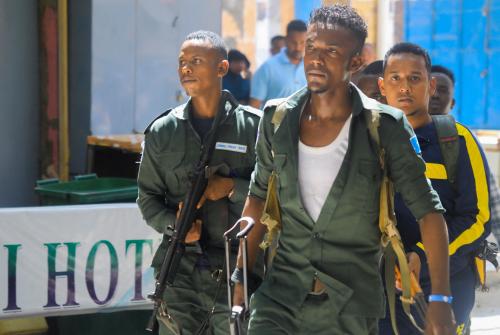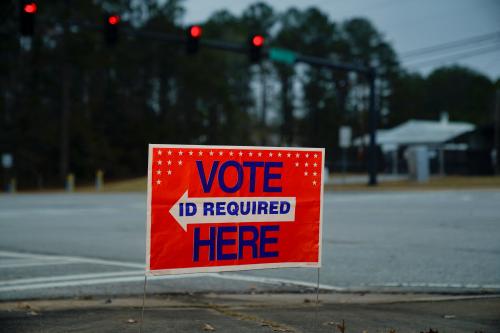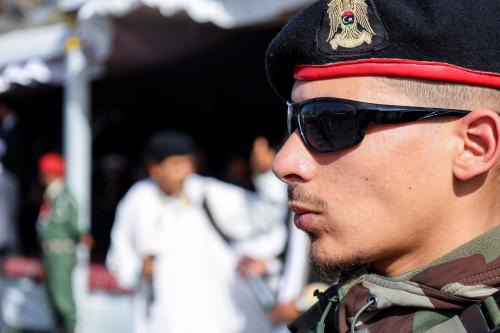In his State of the Union speech last week, President Bush declared that “whatever it costs to defend our country, we will pay it.” The budget he will unveil tomorrow makes good on that pledge. It will propose the largest real increase in defense spending since the Korean War and would double spending on homeland defense.
But the president’s speech made no mention of foreign assistance for any place other than Afghanistan, no allusion to exploring a modern-day Marshall Plan focused on depriving extremist leaders of the desperate people willing to kill themselves and others.
This omission could prove to be the Achilles’ heel of America’s campaign against terrorism. More bombs abroad and better barriers at home will make it more difficult for potential terrorists to do us harm. But it won’t stop them from trying—and succeeding. As one Irish Republican Army member said after failing to kill British Prime Minister Margaret Thatcher: “Remember, we have only to be lucky once. You will have to be lucky always.”
So the question that we as a nation ought to be asking—even if our leaders are not—is whether securing our safety requires doing more than just preparing for war and new acts of terrorism. Do we also need to address the anti-Americanism that permeates the Arab-Islamic world, an area of more than a billion people stretching from Morocco to Indonesia, from Kazakhstan to Nigeria? And, if we do, are we willing to spend at least some of our money on the types of costly programs that helped rebuild Europe and Japan after World War II and effectively converted our enemies into friends?
Like the eagle on the dollar bill, which clutches an olive branch in one talon and arrows in the other, we could strike a balance. We can afford to try to build peace at the same time we’re building bombs.
Military might
Not everyone believes such a balance is necessary. Some note that most people who hate us will never hurt us. They believe, as syndicated columnist Charles Krauthammer does, that anger and resentment at the United States “is a constant. The variable factor is whether America commands respect or contempt.” In other words, if we punish our enemies, no one will dare attack us or help those who would.
Krauthammer has a point. Al-Qaida is on the run because of our military might; it’s not because, as he correctly if sarcastically writes, “the president hosted Muslim envoys for a White House Iftar dinner.”
But it is the tyrant’s fallacy to believe that intimidation alone can produce security. We can depose regimes that support terrorists, yet the vulnerability of our society enables small groups of people to inflict tremendous harm on us even without a government sponsor. Osama bin Laden was a guest of the Taliban in Kandahar, but Mohamed Atta plotted the hijackings in Hamburg and Miami.
Looked at that way, addressing anti-Americanism is essential to our security. Not because hatred of the United States turns people automatically into terrorists, but because it gives terrorists what they need most—people willing to support them. If terrorists are shunned by the people they claim to represent, they are far easier to defeat.
We can never eliminate anti-Americanism entirely. Its causes extend beyond poverty and oppression. Bin Laden and his ilk will always hate us because they reject our values. They see our tolerance, materialism and pluralism as decadent and hollow. And as long as we are a great power, we will inspire envy and resentment in some.
Fortunately, few people’s hatred runs that deep. Most people in the Arab-Islamic world reject bin Laden’s medieval worldview. They avidly consume Western culture—witness the popularity of McDonald’s restaurants and Hollywood movies. They admire America’s capitalist spirit and democratic values. A poll taken last fall found that more than 80 percent of the people living in the Arab-Islamic world saw America as a land of opportunity. Less than 20 percent dismissed our democratic appeal.
Still, many people in the Arab-Islamic world are also convinced that we are indifferent, if not hostile, to their plight. They’ve heard us describe ourselves as defenders of democracy but seen us embrace authoritarian governments. They’ve heard us trumpet our generosity but seen little evidence of it in their own lives. They’ve watched us bomb Afghanistan but seen us shy away from the difficult task of rebuilding war-torn countries. We should not be surprised when they ask: “Why should we feel pity for your travails when you seem so uninterested in ours?”
Diminishing anti-Americanism will be difficult. In some cases, we are dealing with deeply ingrained perceptions, not facts. Many in the Arab-Islamic world forget that we rescued Somalia from famine and intervened militarily to protect Muslims in Bosnia and Kosovo. Yet, misunderstandings run so deep that, even now, many in the Arab-Islamic world insist that bin Laden was not responsible for Sept. 11.
Better public diplomacy is a must. U.S. officials should appear regularly on news outlets such as Al-Jazeera to make America’s case to the world. Washington should also step up efforts to broadcast its message to the region through Voice of America and increased cultural and educational exchanges. President Bush’s call to double the number of Peace Corps volunteers will be a help as well. To know us may not be to love us, but it may mean hating us less.
Public diplomacy, though, can only do so much. We must ultimately match our words with deeds.
New Marshall Plan
The Bush administration has pledged $297 million over the next year for Afghanistan’s reconstruction. But Washington needs to think in terms larger than Afghanistan.
We should apply the lessons learned after World War II. Then, we spent billions of dollars to rebuild Germany and Japan, giving our former enemies a stake in creating productive and democratic societies. We could do the same today by working with our allies to develop a new Marshall Plan to address the hopelessness that poverty breeds and terrorists thrive on. People who have hope for a better future—a steady job and better means to provide for their families—will be less likely to blame America and others for their ills.
The Bush administration appears to have weighed in on this issue already. The New York Times reported last week that diplomats said the administration had rejected a (British-led) effort to persuade wealthy nations to increase their total foreign aid by $50 billion annually, double what they currently give. The administration has said that before increasing aid, donors should ensure they pick more effective projects and the countries getting the money should reduce corruption.
One major problem in motivating other Americans to fund a new Marshall plan is that many think we already spend a lot on foreign aid. A 1995 University of Maryland poll found that on average Americans believe that we spend 15 percent of the federal budget on foreign aid. This year, a 15 percent contribution would equal nearly $300 billion. If that were true, we would already have a new Marshall Plan.
But we actually spend only a half a penny out of every federal dollar on foreign aid, or about $12 billion annually. This is only one-fourth of President Bush’s proposed $48 billion increase in defense spending. It is also puny by our historical standards. The Marshall Plan consumed 1.5 percent of our gross domestic product, a number 15 times higher than today. And we launched the Marshall Plan at a time when we also were dramatically increasing defense spending to combat the Soviet threat.
Foreign aid is no magic bullet. If it were, Egypt, which has received more than $55 billion in aid from the West over the past 25 years, would be prosperous today. But spent wisely, such aid can make a difference. It can help friendly states develop the law enforcement capabilities they need to track and capture terrorists in their midst. It can improve people’s health and living conditions. It can be used to teach farmers to become more productive, so that fewer people will starve. It can also give people a stake in the global economy and can create common interests with us and a reason to work together.
More foreign aid can also be used to counter institutions in the Arab-Islamic world that preach anti-Americanism, including schools. America is better off if Pakistani and Palestinian children go to publicly funded schools that teach them a broad curriculum rather than to privately funded religious schools that teach hatred of America and intolerance of others. But that takes additional resources, so that there are enough public schools to give all the kids at least a basic education.
Aid could also be used to bolster the emergence of civil societies. One key way to do that is to financially support the networks of local groups that are independent of government control and central to democratization. Human rights monitors can hold governments accountable. Trade unions can protect the rights of laborers. Development organizations can provide training and credits to help women set up small businesses. And political groups can nurture viable oppositions.
A new Marshall Plan will not eliminate anti-Americanism. That goal is as unachievable as ridding the world of evil. What these policies can do is lower the flames of anti-Americanism. And that would contribute as much as bombs and barriers to bolstering our security.



Commentary
Op-edSecurity Comes with Building Peace, Not Just Barriers
February 3, 2002